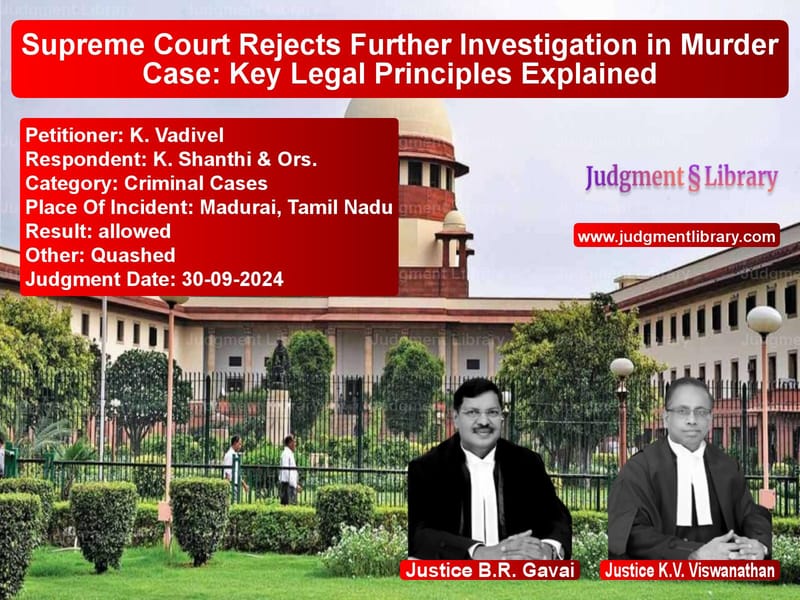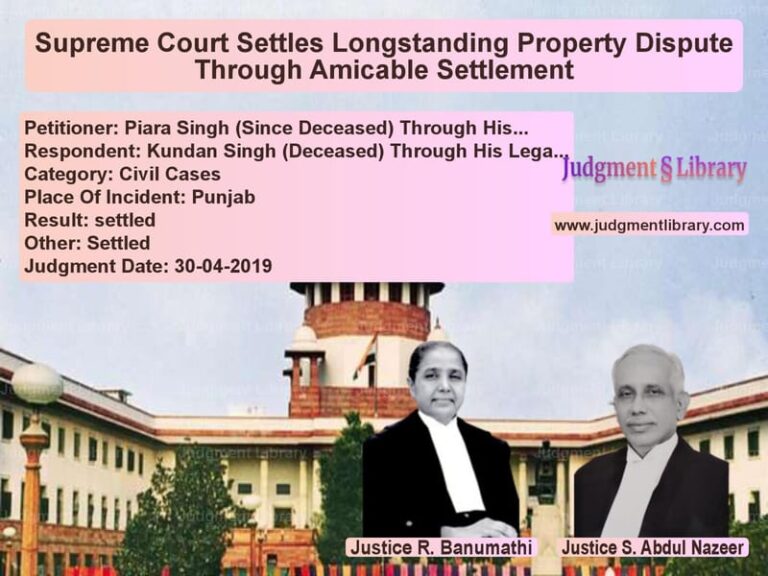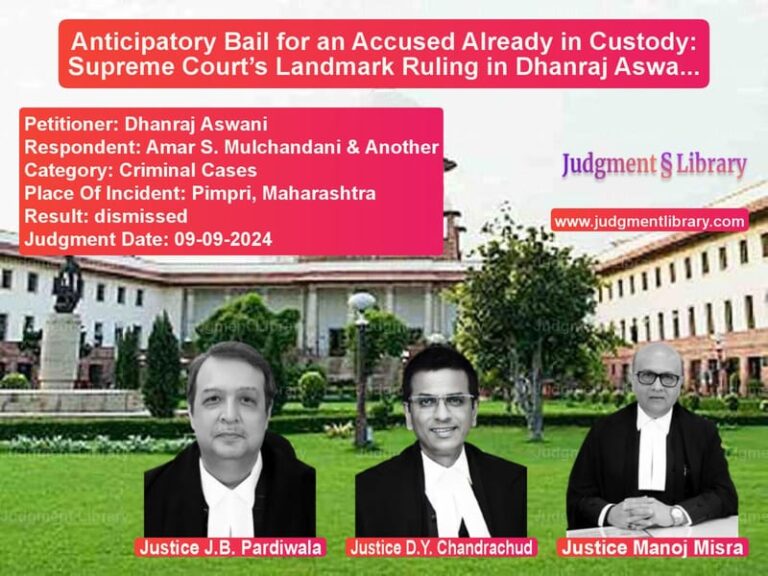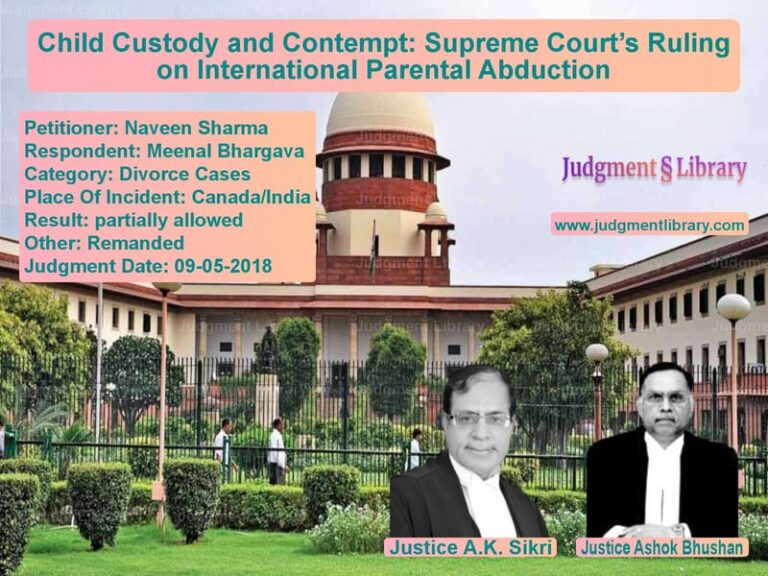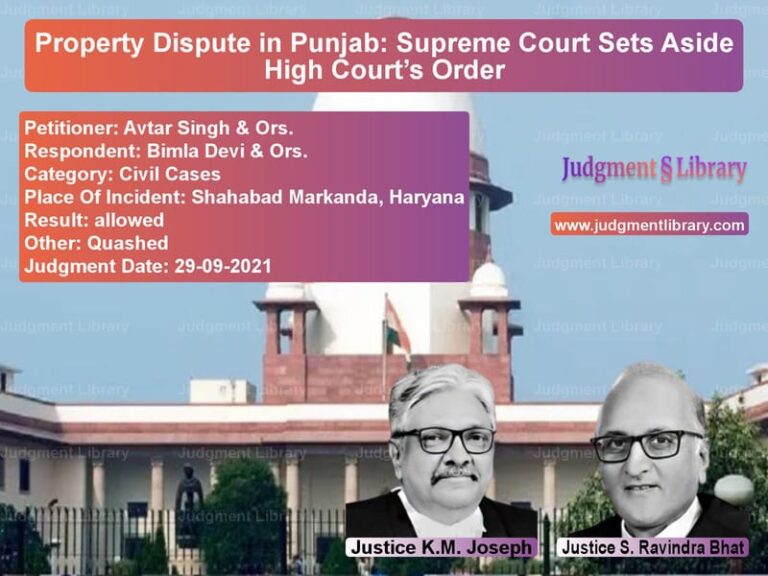Supreme Court Rejects Further Investigation in Murder Case: Key Legal Principles Explained
The case of K. Vadivel vs. K. Shanthi & Ors. revolved around the legal validity of ordering further investigation at an advanced stage of a criminal trial. The Supreme Court overturned the Madurai Bench of the Madras High Court’s decision, ruling that the order for additional investigation under Section 173(8) of the Criminal Procedure Code was legally untenable and that the trial should be concluded expeditiously.
Background of the Case
The case pertained to the murder of Kumar, which occurred on March 31, 2013. According to the FIR, three assailants emerged from a car and attacked the deceased. The primary witness, Padikasu (PW-1), initially claimed to have seen one of the accused carrying a sickle but later contradicted his statement. The accused, including K. Vadivel (appellant), were charged and placed on trial.
During the trial, K. Shanthi, the wife of the deceased, sought to introduce additional witnesses through a Section 311 CrPC application. This was rejected by the trial court, and the decision was upheld by the High Court. Undeterred, she later moved for further investigation under Section 173(8), which the High Court allowed. This prompted the accused to challenge the order before the Supreme Court.
Key Legal Issues
The Supreme Court examined the following issues:
- Whether the High Court was justified in ordering further investigation after the trial had nearly concluded.
- Whether the request for further investigation was a disguised attempt to overturn the denial of additional witnesses under Section 311 CrPC.
- The scope and limitations of further investigation under Section 173(8) CrPC.
Arguments by the Appellant (K. Vadivel)
The appellant, represented by senior counsel, argued:
- The High Court’s order lacked justification and was based on vague assertions.
- The trial had already reached its final stages, and allowing further investigation would unjustly delay proceedings.
- The prosecution had already examined witnesses, and the fresh investigation attempt was a means to manipulate the trial.
- There was no new evidence warranting a further probe.
Arguments by the Respondents (State and Wife of the Deceased)
The respondents countered:
- Further investigation was necessary to uncover crucial facts omitted from the initial probe.
- The prosecution had overlooked key witnesses, whose testimonies could strengthen the case.
- The principle of justice outweighed procedural technicalities, and a fresh investigation would ensure a fair trial.
Supreme Court’s Observations
1. The Legal Scope of Further Investigation
The Supreme Court acknowledged that further investigation under Section 173(8) is permissible even after a charge sheet is filed. However, it emphasized that:
“Further investigation cannot be used as a tool for a fishing and roving inquiry when the prosecution has already presented its evidence.”
2. Delay and Procedural Misuse
The Court noted that the request for further investigation was filed nearly seven years after the FIR and at a stage when trial arguments had been completed. It stated:
“The attempt to introduce further witnesses after the rejection of a Section 311 application indicates a misuse of the judicial process.”
3. Absence of Substantial New Evidence
The Court found that the request for further investigation was not backed by any new material evidence. The respondent’s argument that certain eyewitnesses were not examined was dismissed on the grounds that:
“The witnesses sought to be examined had been available throughout the trial, yet no effort was made earlier to summon them.”
4. Role of the High Court
The Supreme Court criticized the High Court’s order as being vague and lacking substantive reasoning. It pointed out:
“The High Court provided no legal justification for why further investigation was necessary after the completion of trial arguments.”
Final Judgment
The Supreme Court allowed the appeal, setting aside the High Court’s order for further investigation:
“The additional charge sheet dated 02.12.2021 will not be taken on record, and the trial must be concluded within eight weeks.”
Impact of the Judgment
This ruling reinforces critical principles in criminal jurisprudence:
- Further investigation must be based on substantial new evidence and cannot be used to rectify procedural lapses.
- Judicial orders must be reasoned, and vague justifications do not suffice for ordering fresh probes.
- Finality in trials must be respected to prevent undue delays and ensure justice is served in a timely manner.
- Litigants must not be allowed to misuse procedural mechanisms to prolong trials for tactical advantages.
This judgment serves as a landmark precedent in cases where further investigation is sought at an advanced stage of a criminal trial.
Petitioner Name: K. Vadivel.Respondent Name: K. Shanthi & Ors..Judgment By: Justice B.R. Gavai, Justice K.V. Viswanathan.Place Of Incident: Madurai, Tamil Nadu.Judgment Date: 30-09-2024.
Don’t miss out on the full details! Download the complete judgment in PDF format below and gain valuable insights instantly!
Download Judgment: k.-vadivel-vs-k.-shanthi-&-ors.-supreme-court-of-india-judgment-dated-30-09-2024.pdf
Directly Download Judgment: Directly download this Judgment
See all petitions in Murder Cases
See all petitions in Bail and Anticipatory Bail
See all petitions in Judgment by B R Gavai
See all petitions in Judgment by K.V. Viswanathan
See all petitions in allowed
See all petitions in Quashed
See all petitions in supreme court of India judgments September 2024
See all petitions in 2024 judgments
See all posts in Criminal Cases Category
See all allowed petitions in Criminal Cases Category
See all Dismissed petitions in Criminal Cases Category
See all partially allowed petitions in Criminal Cases Category

